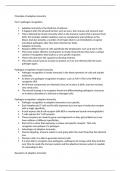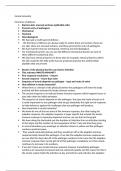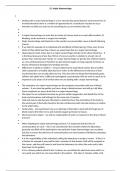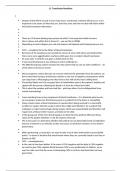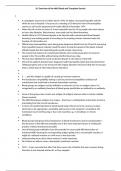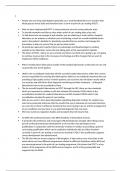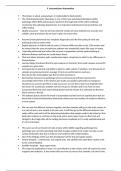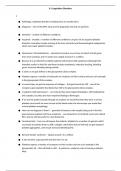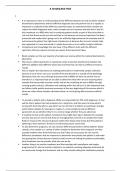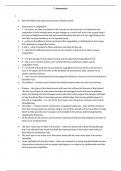Aston University, Birmingham (ASTON)
Latest uploads at Aston University, Birmingham (ASTON). Looking for notes at Aston University, Birmingham (ASTON)? We have lots of notes, study guides and revision notes available for your school.
-
473
-
4
-
24
Courses at Aston University, Birmingham (ASTON)
Notes available for the following courses at Aston University, Birmingham (ASTON)
Latest notes & summaries Aston University, Birmingham (ASTON)
• Adaptive immunity is the third line of defence. • It happens after the physical barriers such as tears, skin mucous and stomach acid. • This is followed by innate immunity which is the immune system that is present from birth, this includes soluble mediators such as complement and cytokines in the blood. And also includes a number of cell types that it can immediately recognise and attack pathogens after they have infected our body. • Adaptive immunity • Requires different types ...
preview:First lines of defence • Barriers-skin, mucosal surfaces (epithelial cells) • Prevent entry of pathogens • Mechanical • Chemical • Microbiological • We have got a multi layered defense. • the first lines of defense are always ready for action these are barriers, these are our skin, these are mucosal surfaces, and these prevent the entry of pathogens. • We have barriers that are mechanical, chemical and microbiological. • For mechanical barriers you can se...
preview:• A major haemorrhage can arise due to variety of reasons such as a road traffic accident, GI bleeding, aortic aneurism or surgery for example. • Major haemorrhage and blood loss is the number one preventable cause of death following trauma. • If we take the example of an individual who had 80mls of blood per kg, if they were to lose 40mls of that within less than 3 hours we would class that as a major haemorrhage. • Hypovolaemic shock arises due to a major haemorrhage and due...
preview:• Cross matching forms a key component of blood transfusion – it is ultimately what we do – we are gong to make sure the blood we give to a patient form the donor is compatible. • Many reasons when a blood transfusion is required form being involved in a road traffic accident or surgery (elective surgery where they might need blood) or for a patient that undergoes a major haemorrhage during surgery which was unpredictable and therefore will require lots of blood. Other reasons a...
preview:• They are unusual in that the natural occurring antibodies occur in the plasma of subjects who lack the corresponding antigen even if they’ve never been transfused or been pregnant. • The most important of these are anti-A and anti-B, they are usually IgM and react optimally at cold temperatures (4°) although they are reactive at 37° as well. • Immune antibodies develop in response to the introduction of RBCs that possess antigens that a person lacks, and this can occur duri...
preview:• People who are living with diabetes generally use a small handheld device to monitor their blood glucose levels daily and therefore that's a form of point of care testing (POCT). • Why we have implemented POCT in some particular areas for some particular tests. • To provide examples and discuss sites where point of care testing plays a key role. • To talk about how we manage it and whether you are obtaining a result within a hospital laboratory on an analyser or whether y...
preview:• This lecture is about autoanalysers in relationship to biochemistry. • The clinical biochemistry laboratory is one of the most automated disciplines within pathology within BMS and because it performs the huge bulk of the entire workload received by the pathology department, it is important understand turnaround times and reflex testing. • Quality assurance – how do we know that the results we have obtained are accurate and reliable, what procedures do we have in place to ens...
preview:● Glanzmann’s thrombasthenia – autosomal recessive so you have to inherit a faulty gene from mum and dad, and it is quite rare roughly around 1 in a million. ● Because it is an inherited condition patients will present with symptoms following birth therefore earlier in their life and these include nosebleeds, extensive bruising, bleeding gums, excessive bleeding during periods. ● It arises as we get defects in the glycoprotein 2b3a complex. ● Platelets express a number of ...
preview:• It is important to have an understanding of the different diseases we look at within medical biochemistry laboratories and the different diagnostic tests we perform but it is equally as important to understand the difference specimen types to understand which samples we require for which diagnostic tests, which samples we can't process and why that is and it's also important as a BMS when you're analysing patient results as part of that to be able to rule out that these results ar...
preview:• Haemostasis is coagulation. • 1 – of course, we want our blood to clot if we get an injury but why is it important that coagulation is only initiated when we get damage to a vessel wall, why is not a good thing if we were to bleed excessively and not control blood loss and why is it not a good thing if we have this increased tendency to clot spontaneously. • 2 – what are the different factors involved within coagulating or clotting blood, that ranges from platelets to coagu...

